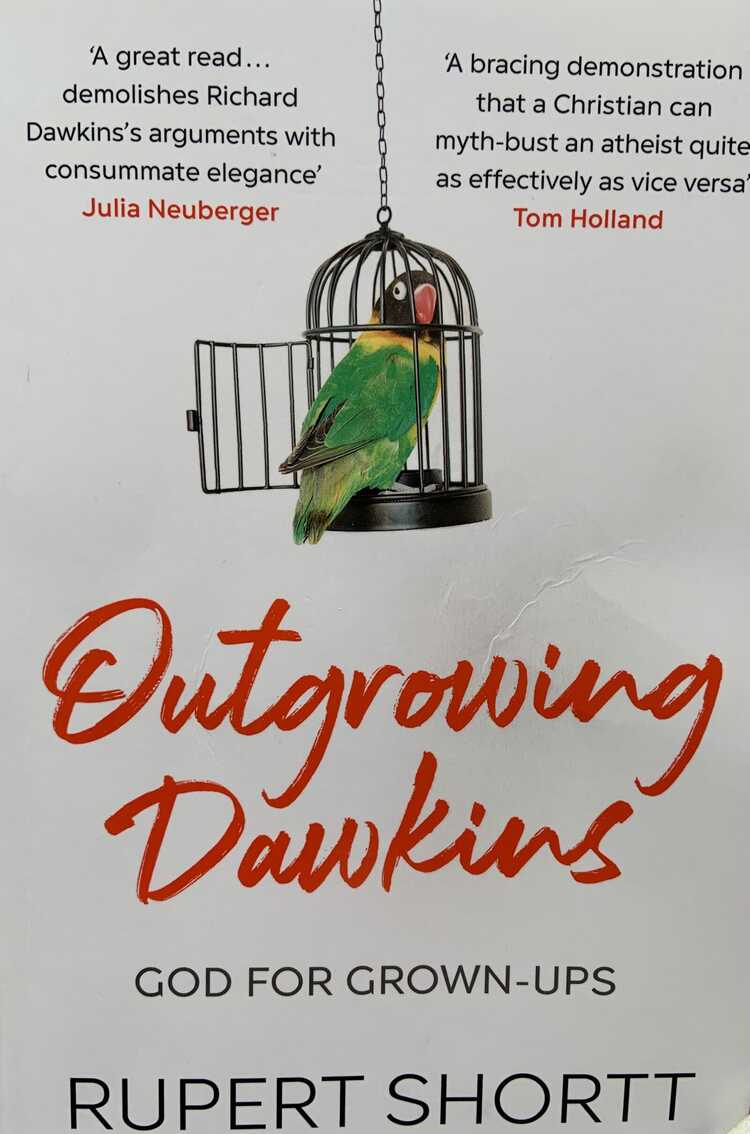Book Review: Outgrowing Dawkins by Rupert Shortt

"If you’re looking for a succinct reminder on why the arguments of atheists such as Richard Dawkins fall down on several levels, then this may be the book for you."
As a Reverend and a scientist working in an intensely secular and post-modern environment, I was eagerly awaiting Rupert Shortt’s new book. Rupert Shortt’s latest book, is, like his name, short! If you’re looking for a succinct reminder on why the arguments of atheists such as Richard Dawkins fall down on several levels, then this may be the book for you. I read the three chapters of the book over two evenings, but you could easily manage it in one read, especially if recently familiar with Dawkins’ Outgrowing God and The God Delusion. Shortt does accept that some of the atheistic arguments are well made but he hits out at the rather dogmatic approach of authors like Dawkins who merely touch on the” iceberg tip” of the foundations and doctrine of Christianity, don’t investigate its authenticity seriously or operate on a basis of fair-mindedness.
The first chapter entitled “A dialogue of the deaf” blows out of the water the common misconception that Christians can’t possibly believe in evolution, and that evolution is incompatible with a belief in God.
It opens with the remarkable statement “Did you know that it was a Catholic priest who proposed the Big Bang Theory in the first place”? It also reminds the reader that faiths have had a tremendously positive impact on widely different areas such as charitable outreach, abolition of slavery and supporting human rights which all are frankly ignored by Dawkins.
His views are distorted and he takes the weakest statements that support belief and derides them as the only versions. Even fellow atheists such as Anthony Kenny are critical of his assumptions.
Chapter 2 “God for grown-ups” focuses on aspects such as several different deities or religions rather than refuting the existence of a God, point to a convergence of a search for a divine transcendence. I strongly empathise with that argument. I shall always remember visiting the Chauvet Cave in the Ardèche region of France containing cave paintings 36 000 years old where the artists depicted the glory of the sun and “worshipped” it. Rather than being “soft headed” it seemed to me that the artists were perhaps tapping into that omnipresent being in the universe, our knowledge of which has refined itself as man’s thinking has developed into different “religious” forms. As Shortt notes however, even the polytheistic faiths such as Hinduism do show aspects of monotheism, something which Dawkins chooses to disregard. One would expect Dawkins to be secure on scientific ground, but even he appears outdated now in his reductionist approach rather than recognising recognised teleological approachs i.e. “selfish” genes themselves cannot be agents of their own destiny but work as part of a complex whole. That surely opens up the question is there a God that ultimately sustains everything and attracts processes to their fulfilment? Not a consideration for Dawkins!
"If this book helps the reader to have some arguments at hand to help counter those conversations you may have with sceptics, then that is where I see its main benefits."
The final chapter explores the theme “Live and let live”. The beauty of this chapter is that it raises the argument that Dawkins does not seem to agree with himself. Ironically, Dawkins is scathing about the dangers of certainty yet seems to overlook the dangers of atheistic fundamentalism. Dawkins is quite certain that we should take courage in both hands and give up on all gods, yet surely even he couldn’t disagree with Socrates’ great insight that “the key to wisdom is not how much you know but having some understanding of the limits of your knowledge.”
If this book helps the reader to have some arguments at hand to help counter those conversations you may have with sceptics, then that is where I see its main benefits. Have you considered this, have you considered that, did you know that Dawkins arguments do not include x for example? It provides ideas to help you encourage others to go away and at least read Dawkins’ books with a more critical eye. Would it persuade an atheist on a first read? No, it wouldn’t, but there is a well referenced Notes section at the back for readers to read more deeply if they wish.
The Rev’d Dr Jenny McKay
Veterinary Pathologist and Curate at St Mary and All Saints’, Great Budworth, Cheshire.

About The Author
Rupert Shortt is Religion Editor of the Times Literary Supplement and a former Visiting Fellow at Oxford University. His recent books include Benedict XVI (2005), Christianophobia: A Faith under Attack (2012), God is No Thing: Coherent Christianity (2015) and Does Religion Do More Harm than Good? (2019).
Posted on May 24th 2021

